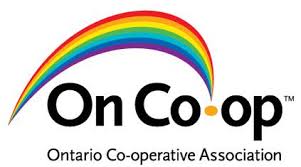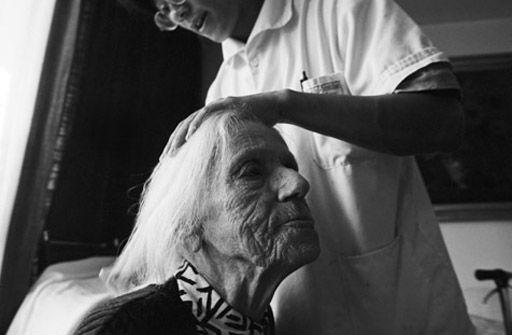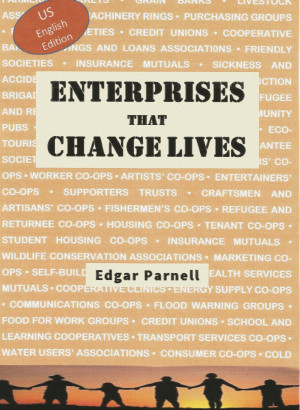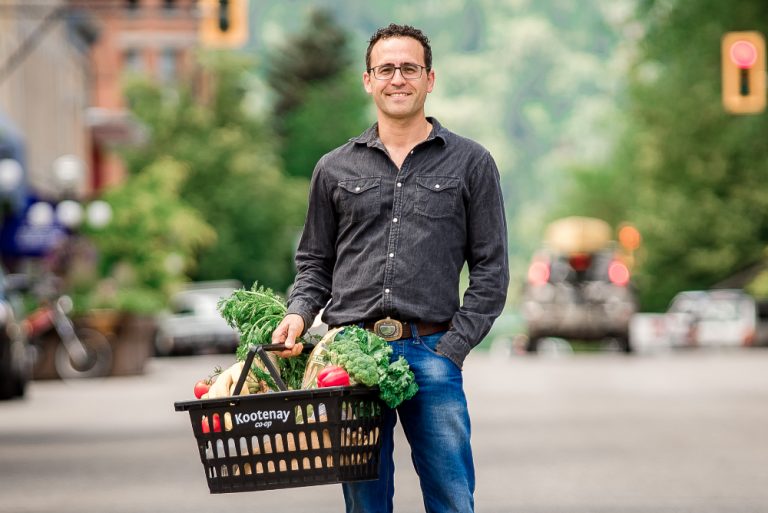|
|
|
|
 |
CWCF Member Profile Series

In CWCF's recently approved strategic plan, one of the priorities established was increased member engagement. Members want to build greater connections with each other and learn from each other's successes and challenges. That's why we're going to start profiling one of our member co-ops in each issue, beginning with Fourth Pig Construction. We hope these brief profiles will be engaging and informative, and lift up the human side of co-ops. If you would like your co-op to be profiled, please contact Kenzie Love, Communications Assistant, at [email protected] |
Fourth Pig Construction Cuts Carbon Emissions Through Green Building Techniques
 |
|
 |
Fourth Pig cofounder Matt Adams (left) |
When Fourth Pig Construction launched in 2007, its founders were out to make a difference, both in the type of buildings they made and the type of business they established. They were going to make and renovate buildings using green building methods that would reduce carbon emissions. And they were going to be a worker co-op.
"Our feeling was that if we want to build differently then we should also have an organization that's more sustainable, to sort of model in our practices what we try to do in our work", says co-founder Matt Adams.
Although Fourth Pig takes pride in the design of their buildings, there's a lot more to their mission than mere construction. In keeping with their objective of reducing greenhouse gases from the construction sector, they're also committed to educating the public about the importance of changing how buildings are made. To this end, they organize and present talks, distribute a newsletter about green buildings and energy, and constantly seek out and research best practices when it comes to green building.
Read more...
|

SSG Receives Contract from the Government of Canada to Work Towards Low-Carbon Economy
SSG is pleased to announce that we have been awarded a contract from Public Services and Procurement Canada to develop a roadmap for reducing the carbon footprint of government operations within Federal buildings, Federally-occupied leased facilities and Federal lands in the National Capital Region (NCR).
The team for this project consists of SSG (project lead), with subcontractors whatIf? Technologies and Rocky Mountain Institute (RMI).
"SSG has been developing fully costed low-carbon energy pathways for cities and regions across Canada for the past decade. We are so pleased to be able to bring our project team's expertise to this critical project for the Government of Canada."
Yuill Herbert
Principal and Co-Founder, Sustainability Solutions Group
Further details of this project are included in the Public Services and Procurement Canada news release, found
here.
|
|
|
|
Glitter Bean's Labour of Love
"Halifax's most inspiring labour story this year was a queer-owned, queer-focused venue where the city gathers to organize, socialize and celebrate." - The Coast

Alison Saunders, The Coast
The workers at the Smiling Goat's Spring Garden Road location weren't given
much warning
the day their cafe closed last April. The building's landlords-Just Us! Coffee Roasters, which sold its two unionized HRM (Halifax Regional Municipality) cafes to Smiling Goat's scorned owner, Kit Singh in September 2017-changed the locks just a few hours after letting the staff know they'd be doing so.
In a way, it wasn't much of a surprise. The news came amidst months of organizing and publicly battling Singh for unpaid wages alongside their fellow baristas from the Smiling Goat's five other locations. But it still felt like another jarring dip in the rollercoaster ride of 2018. The next day staff were called to a meeting at the Service Employees International Union office where a bold idea was pitched: Could they keep the space alive by opening their own cafe?
Read more...
|
|
CWCF Arts and Cultural Granting Program Seeking Submissions from Youth

The Canadian Worker Co-op Federation's past president Mark Goldblatt died suddenly of an apparent heart attack in 2015, a great loss to the Canadian co-op community. Thanks to Mark's bequest, however, his legacy lives on in the form of grants up to $1,000, to help pay for arts and cultural projects to promote co-operatives, preferably worker co-operatives.
The project must be youth-generated (individual or a group/organization, with all or most participants under 35 years of age) and take place within Canada during the year following the application deadline (between May 1 to April 30). Eligible projects include visual art, music, video, theatre, a cultural event, etc. Go to http://canadianworker.coop/co-op-world-music-project/ for examples of projects involving video and music, especially projects 3 and 4, which were created by youth. At the link, you will find the application form. The first annual deadline is April 30th, 2019.
Read more...
|
Inclusive Business and the New Economy Survey

Does your company practice inclusive business or employment strategies? Take Canadian Poverty Institute's short survey about inclusive business practices and tell us about what you're doing and the impact you're making in your community.
|
Departure of CCO's Executive Director / Changements à la direction générale du Conseil de la coopération de l'Ontario
|
|
 |
| Luc Morin |
 |
**Le français suite**
The Conseil de la coopération de l'Ontario (CCO) announces the departure of its Executive Director, Mr. Luc Morin. Mr. Morin has been an employee since 2008. News of his departure comes after it was announced he was offered a position within another organization. His last day was on January 18, 2019. Trained in Business Administration, Mr. Morin has been involved in Franco-Ontarian organizations for over 30 years,
 |
|
 |
Julien Geremie |
more specifically in economic, community and cultural development. Since his arrival in 2008, our organization has grown dramatically, and our team has gone to twelve employees from only two. The CCO has become an essential institution for the social and economic development of Ontario, now with four regional offices and a strong membership structure.
The Board of Directors and the team would like to thank Mr. Morin for his passion, his tenacity and his engagement towards our organization over the years. Starting on January 21, 2019, Mr. Morin will be the Executive Director of the Société économique de l'Ontario (SÉO), a member and partner organization. Our team would like to extend to Mr. Morin their best wishes of success in his new role. Mr. Julien Geremie will lead the process as Interim Executive Director. Mr. Geremie has been on the CCO team since 2010, when he started as a Development Officer in the Ottawa region, before becoming Director of Development in 2013 and Deputy Executive Director in 2017.
Holder of a Master's degree in Political Science from the University of Montreal, Mr. Geremie is a strong supporter of the co-operative values and an individual with deep attachment to our organization and its development. He will work with the Board of Directors to sustain his new role in a timely manner. A heartfelt thank you to Mr. Morin for his exceptional contribution to the development and the success of our organization. We will be happy to work with him in his new role.
**En français**
Le Conseil de la coopération de l'Ontario (CCO) annonce le départ prochain de son Directeur général, M. Luc Morin. M. Morin travaillait au CCO depuis 2008. Il a quitté ses fonctions le 18 janvier 2019.
Possédant une formation en administration des affaires, M. Luc Morin œuvre depuis plus de 30 ans au développement économique, communautaire et culturel de la francophonie ontarienne. Depuis son arrivée au CCO, l'organisme a réalisé une croissance rapide, s'est doté de fondations solides et l'équipe s'est largement agrandie en passant de deux à douze employés. Le CCO est devenu une organisation incontournable du développement économique et social en Ontario avec maintenant quatre bureaux régionaux et une structure d'adhésion qui garantit une croissance continue. Le conseil d'administration et l'équipe du CCO remercient unanimement M. Morin pour sa passion, sa détermination et son engagement envers le CCO.
À partir du 21 janvier 2019, M. Morin sera Directeur général de la Société économique de l'Ontario (SÉO), une organisation membre et partenaire du CCO. Toute notre équipe s'associe pour lui souhaiter le meilleur des succès dans cette nouvelle aventure.
La transition se met déjà en place et M. Julien Geremie en assumera la réussite comme Directeur général intérimaire. M. Geremie est membre du personnel du CCO depuis 2010, lorsqu'il a commencé comme Agent de développement à Ottawa. En 2013, il est devenu Directeur du développement puis Directeur général adjoint en 2017. Détenteur d'une maîtrise en science politique de l'Université de Montréal, M. Geremie est un fervent défenseur des valeurs coopératives et un passionné du CCO et de son développement. Il souhaite collaborer avec le conseil d'administration de l'organisme en vue de titulariser son poste dans les meilleurs délais.
Un grand merci à M. Morin pour son exceptionnelle contribution au développement et au rayonnement du CCO. Nous aurons plaisir à travailler avec lui dans le cadre de ses nouvelles fonctions.
|
Consultation on the Co-operative Corporations Act, Ontario
 Just before the holiday, many co-operatives received a consultation document from the Ministry of Finance titled "Consultation - Legislative Review of the Co-operative Corporations Act". If you did not receive this document, the details can be found online here: www.fin.gov.on.ca/en/consultations/cca/index.html Just before the holiday, many co-operatives received a consultation document from the Ministry of Finance titled "Consultation - Legislative Review of the Co-operative Corporations Act". If you did not receive this document, the details can be found online here: www.fin.gov.on.ca/en/consultations/cca/index.html
The Ontario Co-operative Association is working with our members and the broader co-op sector through our Regulatory Affairs Committee and Government Relations Committee to review the questions proposed in the consultation document and prepare answers. Our organization will share a response to the consultation document with the sector both on our website and through our newsletters in the week of January 14th. The deadline to respond to the consultation is January 31, 2019 and we are working hard to provide a sector response ahead of the deadline. We hope all co-operatives in the sector will respond to the consultations with unified messaging and to that end, OCA will provide notes for your co-operative to consider for your response to the consultation questions.
Please contact Erin Morgan at [email protected] if you have any questions or concerns about the consultation process.
|
|
News from the Fall Economic Update
 The Minister of Finance delivered his
economic update
on November 21, that included announcements that are of interest to the co-operative and mutual sector. Kyle White of Co-operatives First has
more information
on the update's implications for co-ops in areas including social finance, housing, and trade. The Canadian Worker Co-operative Federation will seek capital for social finance activities in its Tenacity Works Fund, and related financial resources if available from this Social Innovation and Social Finance Initiative. The Minister of Finance delivered his
economic update
on November 21, that included announcements that are of interest to the co-operative and mutual sector. Kyle White of Co-operatives First has
more information
on the update's implications for co-ops in areas including social finance, housing, and trade. The Canadian Worker Co-operative Federation will seek capital for social finance activities in its Tenacity Works Fund, and related financial resources if available from this Social Innovation and Social Finance Initiative.
|
|
Co-op Engagement: Reaching Out to Baby Boomers to Leave a Co-op Legacy
Miles Hadfield, Coop News
The baby boomer generation is reaching retirement age - and with a huge number of business owners in their ranks, there is an opportunity for the employee-ownership sector to win new converts.
In the UK, the question of what happens when these firms transfer ownership has already caught the attention of the co-op and employee ownership sectors. Encouraging the switch to worker control has been highlighted as a route towards doubling the size of the UK co-op sector, a target set by the Co-operative Party.
"There are around 120,000 family-run small and medium enterprises in the UK expected to undergo a transfer of ownership in the next three years. If just 5% of these businesses were supported to make the transition to employee ownership or one of the other mutual or co-operative models available in the UK, then the number of entities in the sector would double."
|
When Employees are the Boss, They Make More, Save More and Are Less Likely to Lose Their Jobs
 Gretchen Beesing and Maria Escorcia, Miami Herald Gretchen Beesing and Maria Escorcia, Miami Herald
For many Americans, the idea that workers can own and manage their own businesses may sound far-fetched, but the success of worker cooperatives as a business model argues for rethinking that assumption. To do that, JPMorgan Chase & Co. and the nonprofit human-services organization Catalyst Miami are joining forces to pilot a new program to support development of employee-owned businesses in Miami-Dade County. The pilot will be JPMorgan Chase's first investment in worker-owned enterprises in Miami and Catalyst Miami's first foray into cooperatives as a strategy to create economic opportunity for more Miamians.
With the pilot's launch, Miami will join other localities where the employee-owned model is being recognized as a powerful tool for economic expansion. New York's Worker Cooperative Business Development Initiative helped create 21 new co-ops in 2015; the City Council subsequently doubled funding for co-op development. From a global perspective, most European countries have strong worker co-op sectors: Italy has more than 25,000 worker co-ops, and Spain's Mondragon Corporation includes more than 75,000 workers.
|
|
How a Series of Disasters Led One Entrepreneur to a Life of Cooperatives
Robert Raymond, Shareable
After a catastrophic earthquake devastated Guatemala on Feb. 4, 1976, Lorena Giron, who was just twelve years old at the time, was trapped under the rubble of her collapsed apartment for hours. She was eventually pulled out of the debris by a rescue team - but her family never made it out. "All of my siblings as well as my mother died," Giron says. "I was the only survivor." The earthquake
claimed approximately 23,000 lives. It was during this time of crisis early on in her life that Giron first experienced the powerful forms of community-led relief efforts that tend to arise spontaneously during times of acute crisis - something that she would carry with her throughout her life. "I think that traumatic experiences make people stronger and more resilient," says Giron. "After the earthquake, we were completely isolated. But in that moment, despite all the losses, we all came together to move beyond that disaster."
Giron's connection to grassroots, community relief was strengthened throughout her subsequent experiences during the Guatemalan Civil War, which was a more chronic disaster that afflicted the country from 1960-1996. Giron's husband was killed in the war, which she says was politically motivated. She says she knew then that she had to leave Guatemala. She moved to the United States, eventually finding herself in New York City, New York. She was living in the Rockaways when, remarkably, she experienced yet another disaster: Hurricane Sandy. At the time Giron says she was commuting two hours a day to get to work as a domestic housekeeper. After the hurricane hit, the commute became impossible, she says, and she lost her job, leaving her unemployed for six months.
But then something unexpected happened at the church that Giron attended.
As a center for community action in a heavily immigrant and low-income community, Giron's church regularly organized a number of events to address the local community's challenges, including things like health campaigns and clinics with immigration lawyers. After Hurricane Sandy hit, the church began forming partnerships with other organizations and activist groups to provide help for those affected.
Read more...
|
Combatting the Shortage of Home Care Workers: Going Co-Op?
 Valerie E. Fulton, National Law Review Valerie E. Fulton, National Law Review
With the number of U.S. residents aged 65 and older projected to more than double from 46 million today to over 98 million by 2060, home care agencies face a litany of difficulties. Among these are that home care agency owners themselves are reaching retirement age. In addition, properly classifying home care workers-and even determining which test to use to classify them-is no easy feat. Moreover, the nature of home care work leads to high worker turnover, and since July 2017,
Centers for Medicare & Medicaid Services (CMS) rule
has required home health agencies to meet more stringent conditions to participate in Medicare and Medicaid programs. In short, fewer and fewer workers are doing more and more for an ever-increasing caseload of patients.
One potential solution-both for the high numbers of agency owners retiring and for the difficulty in retaining home care workers-is conversion to a cooperative model. Industry advocates believe that the home care industry is a fitting candidate for the co-op business model.
|
|
Co-ops Can Help to Secure a Future for Youth at Risk of Exclusion
Anca Voinea, Coop News
Co-ops can empower young people who feel disenfranchised, delegates were told at a conference hosted by CECOP-CICOPA Europe on 20 November.
Bringing together co-operators, students and researchers, EU and national officials from across Europe, the event explored how co-ops can help young people to gain control over their future.
Representatives from social and worker co-operatives looked at the benefits of democratic decision making, as well as what governments and the EU could do to support the development of co-ops.
The event was jointly organized by
CECOP-CICOPA Europe, the European confederation of industrial and service co-operatives, and the
European Youth Forum, the platform of the national youth councils and international non-governmental youth organizations in Europe.
Read more...
|
New Book: Enterprises That Change Lives 
Edgar Parnell
This new book explains how, in the 21st century, self-help enterprise (SHEs) need to be run so that they achieve their purpose and meet the real needs of their members. It specifies the model of enterprise required, sets-out the systems and the culture needed to ensure that they are fully capable of achieving their purpose. The book doesn't advocate doctrinaire approaches, instead, supplies the essential concepts and tools needed to transform how SHEs are organized and managed. The intention is to help leaders think-through the issues involved so that they can make better decisions.
Without the essential method of organization and the systems required, it's highly unlikely that even the most enthusiastic leaders will make a success of their enterprises. The model of enterprise set out in the book takes account of centuries of international know-how, identifying the 'foundation practices' that sustain this form of enterprise, which is designed to ensure self-help enterprises focus on achieving their real purpose and consistently operate in the best interest of their members. The book also explains why individuals, communities, and nations need SHEs if they are to thrive in today's world, and specifies what policy-makers, community-developers and academics can do to help grow and sustain them.
|
At the Cusp of "What's Possible"
Camino
 An Interview with Jon Steinman, author of Grocery Store - The Promise of Food Co-ops in the Age of Grocery Giants An Interview with Jon Steinman, author of Grocery Store - The Promise of Food Co-ops in the Age of Grocery Giants
1. You interviewed scores of people in communities all over Canada and that nation to the South. What did people value most about their local co-op?
People love their food co-ops because they offer an experience of community - an experience often void in the lonely aisles of chain retailers. Walking into a food co-op can feel like walking into a bustling community center. This is certainly the case at the most successful of co-ops. The sensation is not so dissimilar to what draws people to farmers' markets... however, 'drawn' might not be the best word... it's more of a 'hunger' - an innate human craving for face-to-face connection and social gathering with our 'tribe'. The hunger is particularly strong in this very young and experimental age of so-called 'social' media. I've walked into no other type of grocery store that comes anywhere close to offering the joy that is so often found at farmers' markets.
|
2019 Co-operative Young Leaders Dates, Ontario

CYL is a unique summer camp experience for youth ages 14-18. This series of week-long programs brings young people together from all across Ontario to learn about and practice the International co-operative principles, communication, and leadership through games, team building and community projects. For over 50 years, the Co-operative Young Leaders Program (CYL) has been educating and engaging youth in co-operatives. Since its inception in 1967, over 3,300 young people have gone through the program, thanks to the co-operatives and credit unions that have supported it over the years!
In 2017, we also launched Base Camp, a weekend long retreat for youth, ages 12-13, which provides an introduction to co-operatives, credit unions and CYL. More information is available here. Please note that similar programs are available, to varying degrees, in all provinces.
|
|
|
|
|
The Canadian Worker Co-operative Federation (CWCF) is a national, bilingual grassroots membership organization of and for worker co-operatives, related types of co-operatives (multi-stakeholder co-ops and worker-shareholder co-ops), and organizations that support the growth and development of worker cooperatives. CWCF's e-newsletter is available free of charge to anyone with an e-mail address and an interest in worker co-operative developments in Canada.
Please send any comments and suggestions to:
Kaye Grant
Editor of CWCF Newsletter
(204) 257-1198
|
|
|
|